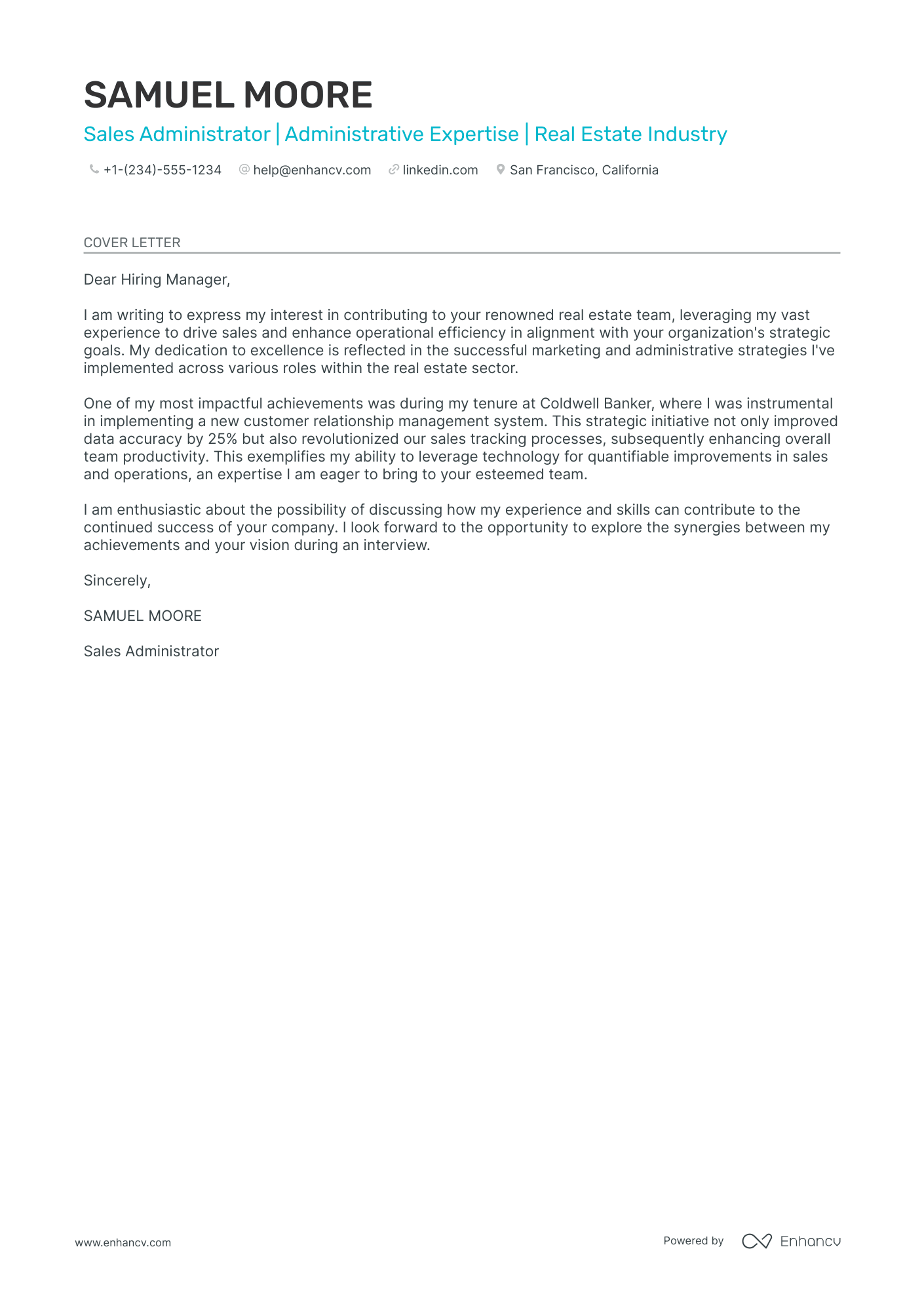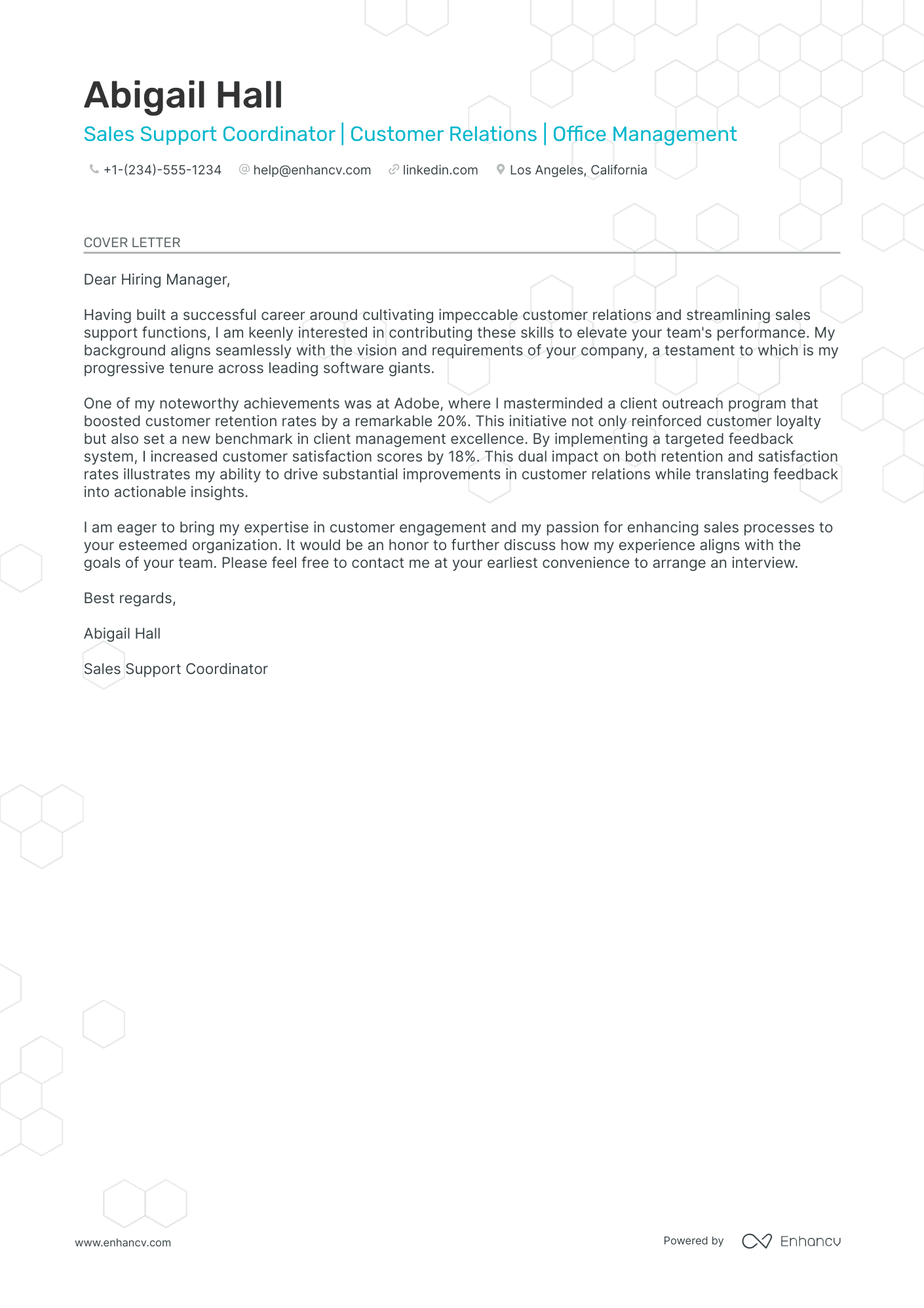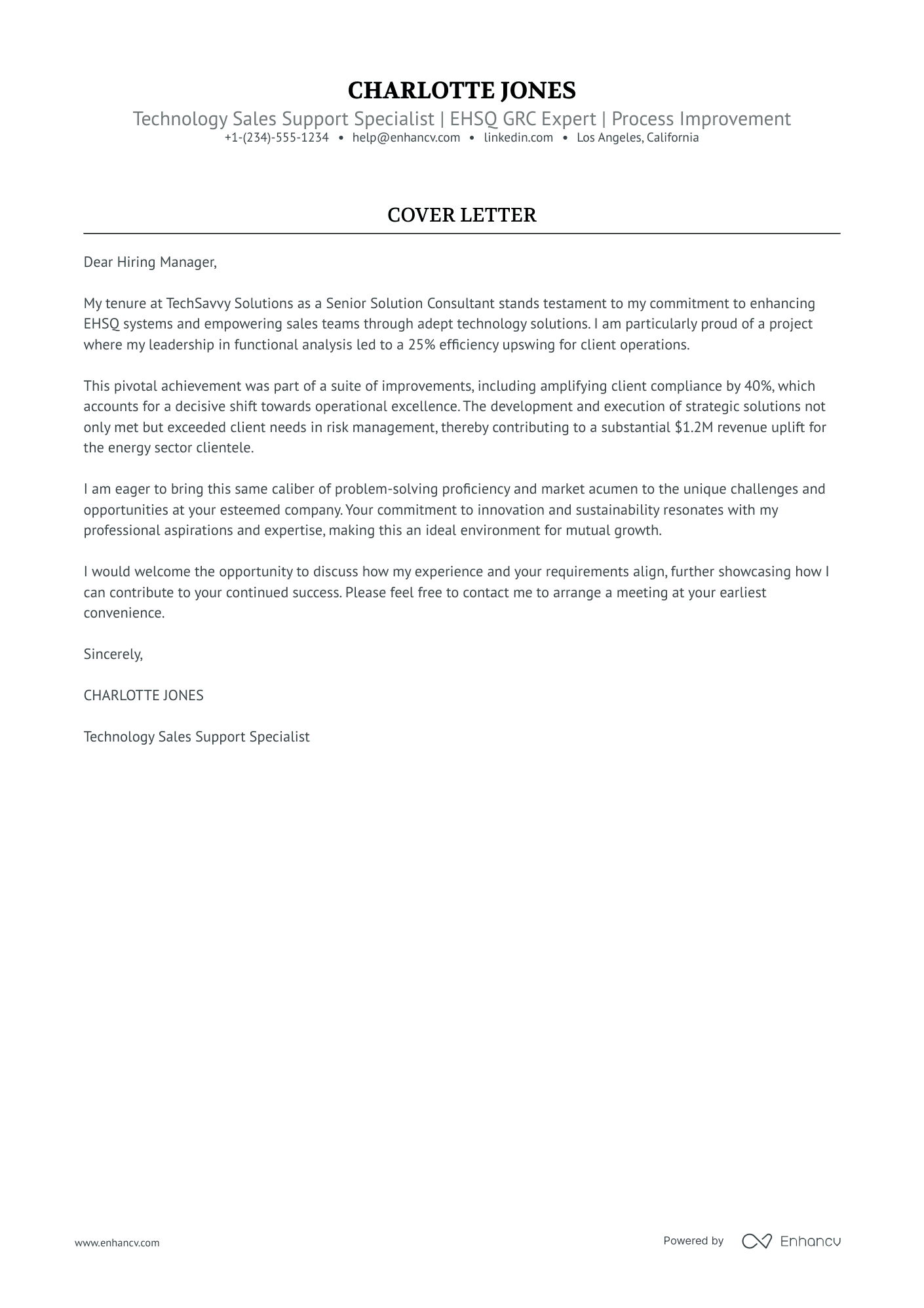As you step into the job market seeking that ideal Sales Assistant role, one obstacle might catch you by surprise: the cover letter. It's not just a repeat of your resume; it's your chance to tell a captivating story about your proudest professional achievement. Crafting a formal yet fresh, cliché-free letter limited to one page can seem daunting, but fear not! We'll guide you through composing a standout cover letter that complements your job application perfectly.
- Making excellent use of job-winning real-life professional cover letters;
- Writing the first paragraphs of your sales assistant cover letter to get attention and connect with the recruiters - immediately;
- Single out your most noteworthy achievement (even if it's outside your career);
- Get a better understanding of what you must include in your sales assistant cover letter to land the job.
Let the power of Enhancv's AI work for you: create your sales assistant cover letter by uploading your resume.
If the sales assistant isn't exactly the one you're looking for we have a plethora of cover letter examples for jobs like this one:
- Sales Assistant resume guide and example
- Medical Device Sales Representative cover letter example
- Luxury Sales cover letter example
- Sales Account Executive cover letter example
- Retail Salesperson cover letter example
- Visual Merchandising Manager cover letter example
- Medical Sales cover letter example
- Customer Account Manager cover letter example
- Executive Sales cover letter example
- Sales Merchandiser cover letter example
- Travel Consultant cover letter example
Drop your resume here or choose a file.
PDF & DOCX only. Max 2MB file size.
Sales assistant cover letter example
Luke Adams
Charlotte, North Carolina
+1-(234)-555-1234
help@enhancv.com
- Highlighting relevant achievements: Mentioning the 15% increase in quarterly sales revenue demonstrates a track record of using data analysis to drive business results, which aligns with the role's responsibilities.
- Emphasizing expertise in key tools and methodologies: Citing the optimization of the CRM database and the development of sophisticated sales forecasting models showcases the candidate’s technical abilities and experience with essential sales support tools.
- Connecting personal success to overarching business goals: The applicant doesn't just share individual achievements but links them to the success of the business, showing an understanding of how sales support functions fit within the bigger picture.
- Demonstrating alignment with company values: By stating that the company’s approach resonates with the candidate's professional philosophy, the cover letter personalizes the application and suggests a culture fit.
The must-have sections and format of your sales assistant cover letter
When writing your sales assistant cover letter, keep in mind that it'll only be read by the recruiters and not the Applicant Tracker System (or software used to assess your profile). That's why you should structure your content with a/an:
- Header (apart from your contact information, include your name, the role you're applying for, and the date);
- Personalized salutation;
- Opening paragraph to win the recruiters over;
- Middle paragraph with key details;
- Closing that starts from clichés;
- Sign off (that's not mandatory).
Industry standards dictate your paragraphs to be single-spaced and to wrap your content in a one-inch margin. Designing your sales assistant cover letter, refer to one of our templates, which automatically takes care of the spacing and margins.
Choose the same font for your sales assistant cover letter as you did for your resume: the likes of Lato and Bitter would help you to stand out in a sea of cover letters in Arial or Times New Roman.
Export your whole sales assistant cover letter from our builder in PDF to keep the same formatting and image quality.
Why spend hours writing a cover letter? Our free cover letter generator can do it for you in seconds.
The top sections on a sales assistant cover letter
Header: The header should include your contact information, which is crucial for a sales assistant role as it demonstrates your attention to detail and provides the recruiter with immediate access to your contact details for a swift response.
Greeting: A personalized greeting shows that you have done your research on the company and the hiring manager, which reflects a key sales skill—tailoring the approach to the individual client or situation.
Introduction: In this section, you should succinctly state your interest in the sales assistant position and mention any referral or connection to the company, highlighting your proactive networking skills which are essential in sales roles.
Body: The body must contain specific examples of past sales achievements or related experience, showcasing your ability to meet targets, understand customer needs, and contribute to team efforts, all of which are important in a sales assistant position.
Closing: Your closing should include a strong call to action, reflecting sales closing techniques, and a statement of enthusiasm about the opportunity to bring your sales expertise to the team, while also thanking the reader for their consideration.
Key qualities recruiters search for in a candidate’s cover letter
- Strong interpersonal skills: Essential for building relationships and effectively communicating with customers as well as team members.
- Customer service experience: Demonstrates the ability to manage customer inquiries, complaints, and ensure a positive shopping experience.
- Energetic and enthusiastic personality: Helps in creating a welcoming environment and positively representing the brand.
- Sales acumen: Indicates an understanding of sales techniques, which aids in meeting sales targets and contributing to the store's profitability.
- Flexibility and adaptability: Important for handling varied tasks and adjusting to different situations or schedule changes.
- Attention to detail: Ensures accuracy in transactions, stock management, and visual merchandising, impacting the overall customer experience and operational efficiency.
The sales assistant cover letter salutation: how to address hiring managers
After covering the format of your sales assistant cover letter, let's look at the salutation.
Back in the day, the cordial "To whom it may concern" or "Dear Sir/Madam", might have worked out fine.
But, nowadays, your cover letter should approach hiring managers on a more personal basis.
So, what to do about your cover letter salutation?
If you've messaged the recruiters and are on a first name basis or a more formal one, use the hiring manager's name in the greeting (e.g. "Dear Sophie," "Dear Ms. Givens", or "Dear Mr. Everett,").
Always aim to make the effort to find out the name of the hiring manager, who'd be assessing your application. Search on LinkedIn, double-check the advert on the corporate website, or message the brand on social media to find out more about the role.
If you can't find the hiring manager's name (and still want to sound professional), use "Dear HR Team,", "Dear Hiring Manager,", or the likes.
List of salutations you can use
- Dear Hiring Manager,
- Dear [Recipient's Name],
- Dear [Job Title],
- Dear [Department] Team,
- Dear [Company Name] Recruiter,
- Dear Members of the [Company Name] Selection Committee,
First introductions in your sales assistant cover letter
Within your sales assistant cover letter introduction, genuinely state what you like about the organization.
Research the latest company projects, honorary awards, company updates, etc.
Write up to two sentences to let recruiters know what impresses you about the company,
This would help you to set a good tone for the rest of the communication.
How to select your best achievement for the middle, or the sales assistant cover letter body
You probably feel exhausted by this point in your application: you've dived into all the details of your success and skills in your sales assistant resume.
What else can you include in your sales assistant cover letter body?
Well, for starters, the next three to six paragraphs should show you further value as a professional. Or, why should recruiters choose you?
Think back on a noteworthy achievement that answers key job requirements and dive deep.
Structure your sales assistant cover letter middle as you'd a story: following chronological logic and highlighting outcomes, thanks to skills.
At the end of the day, you'd want recruiters to be able to see you as the best candidate for the role and understand more about who you are and what makes your success unique (and valuable to the role).
Closing remarks to end your sales assistant cover letter
Of course, you'll have to show gratitude to the recruiters, who have assessed your profile at the end of your sales assistant cover letter .
A "Thank you for the consideration" would work wonders, instead of the standard "Sincerely yours".
Do you want to make an even better impression?
Close off your sales assistant cover letter by promising how you see yourself excelling in the role and the positive impact you'd bring about.
A sentence that encourages some further action on the recruiter's end could also be a good way to close off the communication (e.g. provide your availability for an interview).
What to write on your sales assistant cover letter, when you have zero experience
The best advice for candidates, writing their sales assistant cover letters with no experience, is this - be honest.
If you have no past professional roles in your portfolio, focus recruiters' attention on your strengths - like your unique, transferrable skill set (gained as a result of your whole life), backed up by one key achievement.
Or, maybe you dream big and have huge motivation to join the company. Use your sales assistant cover letter to describe your career ambition - that one that keeps you up at night, dreaming about your future.
Finally, always ensure you've answered why employers should hire precisely you and how your skills would benefit their organization.
Key takeaways
Winning at your job application game starts with a clear and concise sales assistant cover letter that:
- Has single-spaced paragraphs, is wrapped in a one-inch margin, and uses the same font as the sales assistant resume;
- Is personalized to the recruiter (using their name in the greeting) and the role (focusing on your one key achievement that answers job requirements);
- Includes an introduction that helps you stand out and show what value you'd bring to the company;
- Substitutes your lack of experience with an outside-of-work success, that has taught you valuable skills;
- Ends with a call for follow-up or hints at how you'd improve the organization, team, or role.
Sales Assistant cover letter examples
By Role







